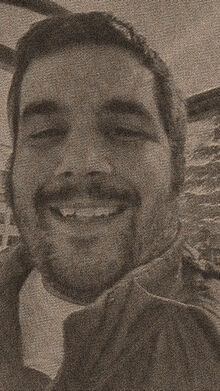
An undated file photo of Thomas Bighill during his days as a young activist.
Emel is a stateless nation whose members live around the world with the greatest concentration living in scattered pockets all over North America, with their largest concentration in the Regina area. All told, worldwide, the Emeldic number over 52 million members, with almost 32 million of those living in North America and over nine million living within the Regina environs.
The Emeldic trace their origins to the 12th century, when the Clash of the Moons saw several ancient North American empires defeated and replaced, with the new empires engaging in ethnic cleansing. The Emeldic are an amalgamation of those groups, and base their entire identity around that struggle for survival. Thus, the Emeldic pride themselves as a "warrior culture", with a strong code of ethics based on chivalry, honour and mutual respect.
Part of their ethos is the provision that the Emeldic must always fight to retain their honour, and never back away when someone disrespects it. While this has led to the Emeldic people earning widespread respect, it has also generated controversy as some Emeldic use the provision as justification to exaggerate their response or to engage in gratuitous violence. Emeldic leaders have struggled to rectify their culture's more violent tendencies, with no clear consensus forming on the topic.
Their most notable member is Thomas Bighill, who began his career as a political activist while studying law at Yale University in the late 1980s. Bighill has since rose in the political arena, eventually being appointed as an Arctic Lieutenant on June 28, 2005 after a distinguished career as a Congressman. On February 9, 2016, Bighill announced himself as a candidate for NAU President following the assassination of Joseph Reddick.
The Emeldic Code[]
The greatest aspect of the Emeldic identity is the Emeldic Code, an evolving tome that covers every aspect of Emeldic life. The Code was first written down in 1309, although scholars widely believe it existed orally for at least a century before. The Code is the first evidence of the Emeldic as a distinct group and thus is the oldest known Emeldic document.
It is not an official rulebook and the Emeldic are free to ignore it, but in practice, intense social and peer pressure forces every Emeldic, man and woman, to follow the Code, as ignoring it has led to ostracism and even death. Thus, even though the Emeldic are technically secular, they view the Code with such reverence it is widely seen as their "unofficial" religion. In fact, the first author of the Code, Jynqek Fikap, is invoked every time an Emeldic swears to uphold it.
The central theme of the Code is honour and respect, with the Emeldic duty bound to seek revenge against anyone who has disrespected them or their loved ones. Ignoring the offence is not allowed as it makes the person look weak. The Code lists several offences, such as murder, rape and theft, that are considered "actionable", but the Code tells the reader that it is up to them to determine the appropriate punishment and a line in the Code allows the reader to engage in revenge "for any other reason not covered in The Code that the reader feels obligated in avenging". The Code initially forbade the reader from garnering outside help, but as the Emeldic transitioned to civilized societies, this provision was soon scrapped.
Another central theme of the Code is a oft-debated provision that stated that the Emeldic are to respect local laws, but "only to the point where they are not burdensome". Many within the Emeldic community interpret this to mean that the Emeldic are justified to revolt against outright oppression, but some within the Emeldic community have taken to using this provision to protest against seemingly reasonable laws and social practices, if not outright ignore or disregard them.
The result of this ambiguity has led to numerous controversies, where some Emeldic people feel justified in engaging in revenge for frivolous reasons as well as the wanton disregard for social norms and local laws. For example, on March 18, 1985, Xynhy Jyu was arrested and eventually convicted of murder in Chicago after strangling a man who had knocked over her coffee. On April 23, 1988, Az Xia had his eviction from an apartment upheld after the Los Angeles District Court rejected his appeal for religious reasons, as the presiding judge noted, "there is no reasonable person who believes that yelling at the top of your lungs and breaking down people's doors at 3:30 AM every night is an acceptable form of conduct." On June 9, 1996, Nican Wakqik in Bentonville, Arkansas was arrested and eventually convicted of aggravated assault for beating another man unconscious after the man allegedly "looked at Wakqik the wrong way". On October 8, 2006, Ykzu Wik was cited for disorderly conduct in Manhattan after witnesses observing him defecating in the middle of a street, as well as tossing his garbage all over the ground and throwing urine at people's faces through a water bottle he had with him. Then on October 7, 2013, Bnaz Jangha of Regina was arrested and eventually convicted of assault and battery after repeatedly bashing a woman's head hard against a wall, all because the woman gave him the incorrect amount of change.
These and many other incidents have caused numerous debates within the Emeldic community about the lengths of the authority of the Code as well as the extent one should follow its every letter. Therefore, it is not uncommon for the Emeldic to experience a lot of friction with other communities, forcing many Emeldic to live in clustered in "ghettos" as municipal officials try their best to keep them away from the general public.
Other important aspects of the Code is physical fitness, requiring every Emeldic to be in as best a physical condition as they can be, as well as requiring the Emeldic to contribute to society "in a meaningful way" (which is not specified). Laziness- aside from disavowing your honour- is seen as the greatest crime one can commit as an Emeldic, with communities unafraid to toss out the lackadaisical without a moment's notice. As a result, many Emeldic are homeless, creating even more friction within communities.
Speech[]
The Emeldic language is closely related to English- in fact, it is said that English evolved from it- as the structure and syntax of Emeldic is identical to English only the Emeldic employ different letters. Generally speaking, English vowels are replaced with the preceding vowel in the alphabet (for example, "E" becomes "I"), with "Y" treated as a vowel, with English consonants replaced with the letter that is three letters behind in the alphabet (for example, "N" becomes "K"), although there are some exceptions. It breaks down as follows:
| English | Emeldic |
| A | y |
| B | w |
| C | x |
| D | z |
| E | a |
| F | b |
| G | c |
| H | d |
| I | e |
| J | f |
| K | g |
| L | h |
| M | j |
| N | k |
| O | i |
| P | l |
| Q | m |
| R | n |
| S | p |
| T | q |
| U | o |
| V | r |
| W | s |
| X | t |
| Y | u |
| Z | v |
The other distinct aspect of the Emeldic language is their accent, which is often ridiculed. Though many different terms are used, the example by comedian Bernie Walters, where he says the Emeldic sound like "ducks", is the one that most sticks with the public. Thus, Emeldic speech can be very thick, making it difficult for non-Emeldic speakers to understand.
